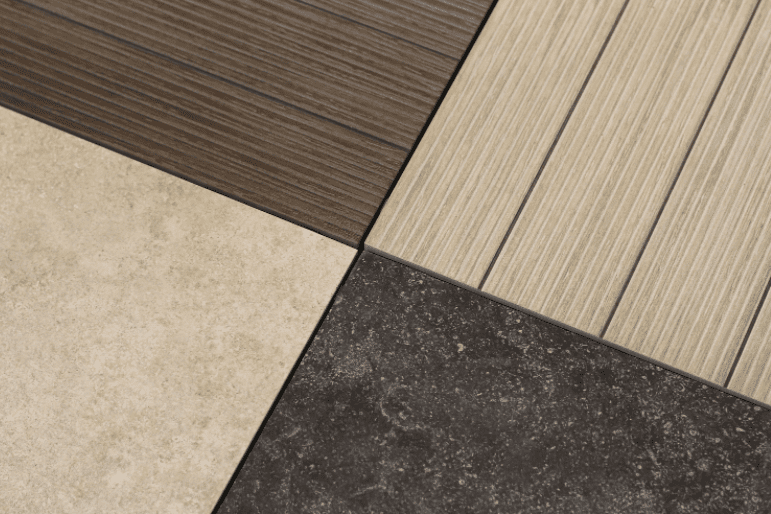Various Flooring Materials
Flooring materials, change the floor in a room, and you change its entire personality. Update the color or style of carpet, lay down a warm wood or laminate, or make any design statement imaginable with tile and — voila! — a room can go from dreary to dynamite.
Hardwood
According to Steve Stan, owner of a flooring company, hardwood is considered one of the best, longest-lasting home investments, wood allows a homeowner to decorate around a consistent color and warmth that you don’t get with tile or carpet. “You can change the room’s color and never have to change the floor again.”
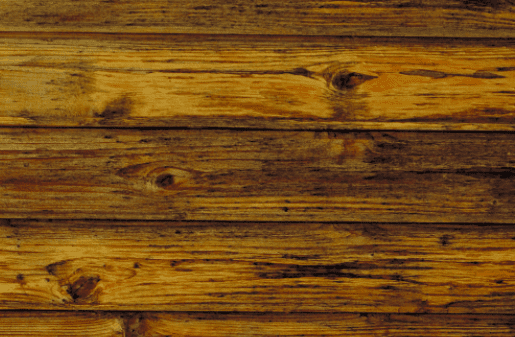
In addition, says Shan Sully, another flooring expert, wood is better than carpet in homes where someone has allergies; also, wood is more easily refinished and restored than most other flooring choices.
Disadvantages: Find something else for the bathroom. “We don’t recommend hardwood in full baths. Wood and water don’t mix. Also, it would help if you had a good subfloor.
It should not be installed over, for example, vinyl asbestos tile, which the homeowner may prefer not to disturb.”
Wood is available pre-finished or unfinished. According to Sully, ” pre-finished lumber offers a virtually dust-free, odor-free installation, a better wear layer, and reduced labor cost.
Care and cleaning: For routine cleaning, use a slightly damp cloth. For a dirtier floor, add a little Murphy’s Oil Soap, said Sully.
Per-square-foot prices: Least expensive hardwoods include “entry-level wood such as red oak, without a real thick wear layer, maybe a builder grade,”
As the price increases, make choices of such species as maple, beech, and Brazilian cherry.
Recommendation: Purchase at least half a box of extra material for easy replacement of sections that become damaged, said Sully.
Do it yourself? Hardwood floors are definitely an option said, Sully
Tile
Nothing surpasses tile when it comes to creativity, says Sheryl Darsy, co-owner of a tiling company. “There is a huge selection, it fits in with your decor easily, and you can always find something that will work.”
Also, said Darsy, “tile is straightforward to keep clean. It looks new every time you wash it.”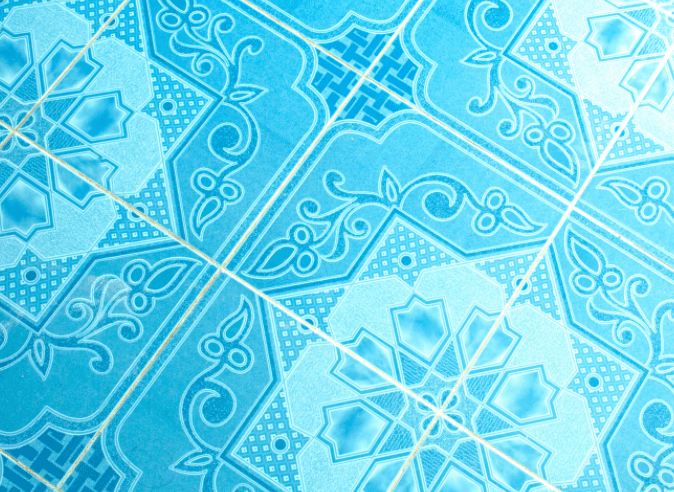
Selection: “The key is to get the suitable tile for your application,” said Darsy. In general, the higher the gloss, the softer the glaze.
For instance, don’t select a 16-inch square shiny gloss floor tile in a hallway with four kids and three dogs. It would scratch too easily.
It could work well in an adult bathroom with less traffic.
The exception to this rule is polished porcelain. “It is polished, not glazed, and so dense that it won’t scratch or stain.”
It’s a good choice for outdoor and commercial applications. Wall tiles should be placed only on walls. Floor tiles can be placed anywhere, even on a fireplace surround.
Care and cleaning: Important changes in the industry include improvements in grouts and sealers, according to Darsy.
Being porous, grout can get dirty, but it is now easier to clean. Sealers can be reapplied when necessary to ensure that dirt doesn’t penetrate the grout.
There also is a new product called epoxy grout that, she says, “nothing penetrates.” Older grout can be brightened with brush-on colorant or stain.
For the most part, sponge cleans any glazed tile, even in crevices. Brush scrubbing usually isn’t necessary, Darsy says.
Stone.
Do it yourself? Yes, said Darsy.
Laminate
Laminate is basically a countertop on the floor, said Sully. It’s more resistant to scratches than hardwood and is more realistic looking than even three years ago.
“Laminate is a piece of craft paper sandwiched between two fiberboards. It offers the warm look of wood and is available in many colors and patterns, but with a higher degree of scratch resistance and at a lower price than wood,” said Denis Caper, a flooring expert.
It is laid over a piece of foam, hence the nickname “floating floor.”
A laminate floor was glued together in its early days, said Caper. “Now it snaps together.”
And, by adding a layer of rubber to the foam, the floor sounds more solid than before.
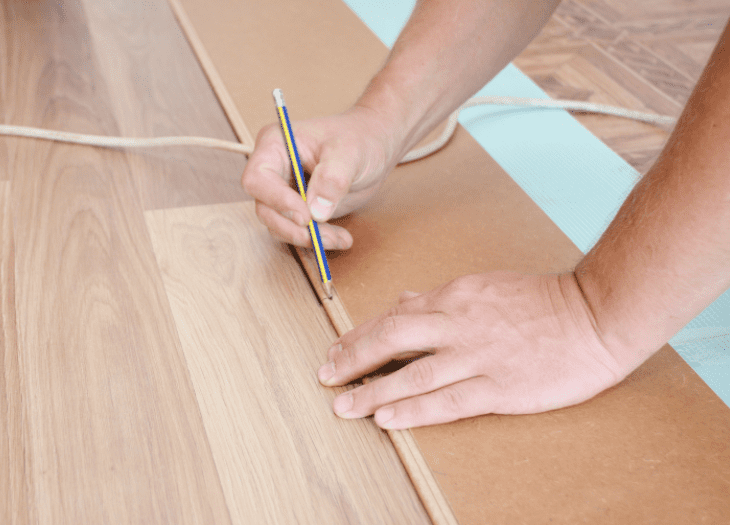
Advantages: Laminate provides a softer feel than hardwood or ceramic tile, said Caper. It can be laid directly over any existing flooring except carpet. The finish can chip, scratch and dent, but not generally as much as hardwood.
The product Caper sells guaranteed for 25 years against fading, staining, or wear through the decorative surface. And many colors and species look-alikes are available these days.
One caution: When cleaning, “don’t swab the deck,” Caper says. Use a spray-on cleaner and dust mop. Flooding can cause the floor to swell and buckle.
Do it yourself? Yes, Caper says.
Carpet
For a plush feel, go with carpet. “Carpet feels very warm and rich under your feet. It’s very soft to walk on,” said carpet store owner Mick Stanley.
Selection: The type you choose varies with traffic in a home and whether there are pets, said Stanley. He sells three main materials: nylon, polyester, and olefin. “Nylon is a porous fiber that can absorb stains.
It needs a stain-blocking agent to repel common household spills. Polyester and olefin are solid fibers, inherently stain resistant.”
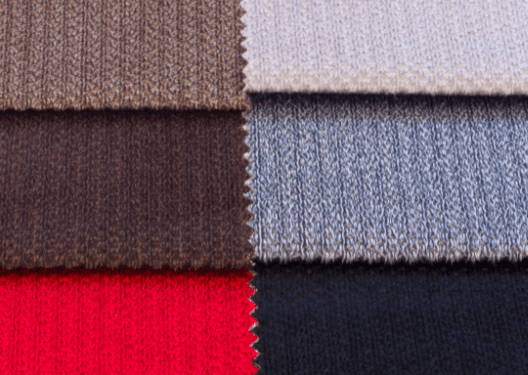
Wool is another option. “Wool is one of the most durable on the market,” said Stanley. “But it can be stained more easily, and you have to be very particular about how it is cleaned.
No heat. Low water content or the wool carpet will actually shrink.” It also is expensive.
When selecting carpet grade, consider the wear and tear that the carpet will receive. The more twists on each fiber, the more durable the carpet will be.
The more fiber you have per square inch, the more the carpet will resist crushing and matting and hold its appearance.
Stanley sells two types of carpets. Berber-types have a tightly compacted loop construction. Shear off the top of the loops, and you get a pile.
For the highest durability, consider a commercial grade. These usually are darker in color and are not intended for installation over a pad. They are glued directly to the floor and produce a hard “walk,” said Stanley.
Do it yourself? Only if you can adequately stretch carpet onto tack strips around the room. Otherwise, the carpet will scoot and buckle.
Sheet Vinyl
“Sheet vinyl (what used to be commonly called linoleum) had lost some ground,” said John Staff, “but it’s making a comeback.
The new generation of finishes and patterns look more like ceramic tile. There are bigger 36-inch and 48-inch patterns, which look more realistic, and don’t repeat as often, so they look more random.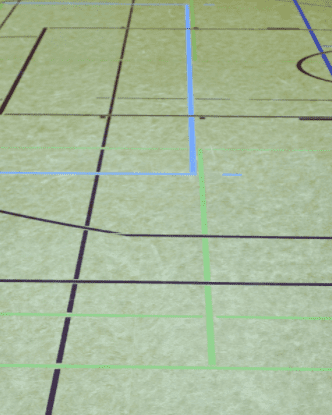
And it’s so much more economical and maintenance-forgiving than any other product you can buy.”
Do it yourself? Absolutely. Get out that Xacto blade and get to work.
Epoxy Flooring
Self-smooth ing/leveling epoxy resin systems laid to a depth of 2-6mm, are widely used for dry process factories, laboratories, clean rooms, packaging, and warehousing facilities, in the electronic, aerospace, automotive, and general manufacturing industries, where the floor is subjected to medium to heavy foot and forklift truck traffic.
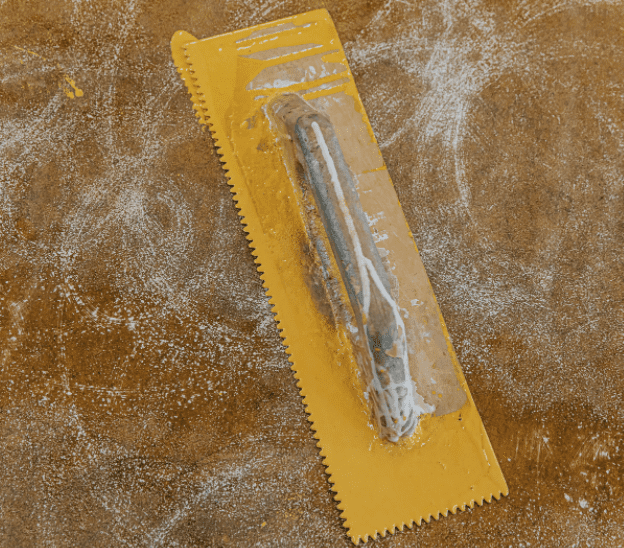
Epoxy resin screeds, laid at 6-9mm, provide a more heavy-duty floor for wet and dry process areas where the floor is subjected to heavy traffic, impact, and chemical spills.
Thin solvent-free epoxy resin coatings (around 0.2mm per coat, with a finish build thickness of around 1 mm) can provide a medium-duty top coat.
Polyurethane seamless screeds and self-smoothing toppings, up to 9mm depth, provide heavy-duty floorings with greater thermal shock and chemical resistance.
These are particularly suited to wet and dry process areas, such as food preparation areas, where the floor is subjected to hot food spillage, steam cleaning, and heavy traffic.
These top-end performance products can have 10-15 years of life expectancy.
Various grades of non-slip finishes can be achieved by incorporating anti-slip aggregates, and special formulations and additives can offer solvent-free, low odor, specific chemical resistant, antistatic, antibacterial, or antifungal properties.
Do it yourself? Not! It takes Professional knowledge



















